Sep 14, 2021
Class A RV Insurance Cost: Pricing Guide & Money-Saving Tips
Class A RV Insurance Cost: Pricing Guide & Money-Saving Tips
A
By Aaron Ammar
Wondering how much it'll be to insure your Class A RV? Learn about the different factors that influence insurance costs and how you can save money with your RV.
Common questions
Blog Post
Education

Class A RV insurance costs range from $1,000 to $4,000+ annually, with industry averages around $1,050 for motorhomes in 2024. Your premium depends on RV value (new Class A units cost $100,000-$500,000+), usage patterns, driving record, location, and coverage level. Full-time RVers pay significantly more ($1,500-$4,000+) due to homeowner-style protections, while recreational users average $1,000-$2,500 annually. Liability-only policies start around $125-$200 yearly, but financing requires comprehensive coverage. Key cost drivers include RV age/condition, claims history, storage location, and coverage choices—with potential savings through bundling discounts, safe driving courses, anti-theft devices, and storage suspension options that can reduce premiums by 10-35%.
How Much Does Class A RV Insurance Actually Cost?
Class A motorhome insurance averages $1,000-$4,000 annually, with industry data showing motorhome policies averaging around $1,050 in 2024. The wide cost range reflects massive differences in RV values—entry-level Class A units start around $100,000 while luxury coaches exceed $500,000. According to recent industry data, the countrywide average premium for a 12-month RV insurance policy is approximately $1,050 for motorhomes, with liability-only policies starting at just $125 per year.
Your specific costs depend on several major factors. For a new Class A RV valued at $100,000 with full coverage and a clean driving record, annual premiums may range from $800 to $2,500 or more. However, the average Class A motorhome insurance cost ranges from $1,000-$4,000 annually, with the wide range reflecting substantial differences in vehicle values, usage patterns, and coverage needs.
Don't get sticker shock—this investment protects what's likely your second-largest purchase after your home. When you consider that one major accident could cost tens of thousands in repairs or total your rig entirely, insurance becomes pretty reasonable.
What Factors Drive Up Class A RV Insurance Costs?
RV value is the primary cost driver, with newer luxury Class A motorhomes costing significantly more to insure than older or smaller units due to higher replacement costs and repair expenses. Insurance companies calculate premiums based on what it costs to fix or replace your specific rig, so a $400,000 Newmar Dutch Star will cost more than a 10-year-old Fleetwood Bounder.
Here's what insurance companies consider when pricing your policy:
RV Value & Age: New Class A motorhomes can cost anywhere from $100,000 to over $500,000, directly impacting insurance premiums. Older models typically cost less to insure, but classic or well-maintained vintage motorhomes may require specialized coverage.
Usage Patterns: How you use your motorhome significantly affects rates. Full-time living results in higher premiums due to increased exposure, recreational use means lower rates for occasional weekend trips, and seasonal use brings moderate rates for summer vacation travel.
Driving Experience: Insurance companies consider your experience driving RVs. Since operating an RV is quite different from driving a standard vehicle, the more experience you've had, the less risky you are to insure.
Location Matters: Where you live, store, and travel affects pricing. High-crime areas, severe weather zones, and states with expensive repair costs typically see higher premiums.
Understanding different types of RV insurance plans helps ensure you're getting appropriate coverage without overpaying for unnecessary protections.
How Much More Does Full-Time Class A RV Insurance Cost?
Full-time Class A RV insurance costs $1,500-$4,000+ annually—significantly more than recreational policies—because it includes homeowner-style protections like personal liability when parked, contents coverage, and medical payments for guests. Full-time RV insurance ranges from $1,500 to $4,000 per year, with insurers treating full-time RV owners similarly to traditional homeowners when determining coverage.
The cost difference isn't arbitrary. Full-time coverage includes protections that recreational policies exclude:
- Personal liability when parked (if someone gets hurt at your campsite)
- Contents coverage for your permanent belongings
- Vacation liability during extended campground stays
- Medical payments for guest injuries, regardless of fault
- Loss assessment coverage for campground association fees
Full-timer RV insurance isn't required by law, but it may protect your assets if you're liable for injuries or property damage while your RV is stationary. Think of it this way: when your Class A is your home, you face the same risks as any homeowner—plus all the risks of being on the road.
If you're considering the full-time RV lifestyle, learn about specialized full-time RV insurance coverage options that protect your mobile lifestyle.
What Coverage Options Affect Class A RV Insurance Costs?
Class A RV insurance costs vary dramatically based on coverage level, with liability-only policies starting around $125-$200 annually, while comprehensive full-coverage policies can exceed $3,000 per year. Your coverage choices directly impact your premium, so understanding what's required versus recommended helps you budget appropriately.
Required Coverage: Most states require liability insurance for motorized RVs, covering bodily injury and property damage you cause to others. If you buy a minimum RV liability insurance policy, you could pay only $125 annually for your coverage.
Financing Requirements: If you're financing your Class A, lenders typically require comprehensive and collision coverage to protect their investment until you've paid off the loan.
Optional But Valuable Coverage:
- Comprehensive & Collision: Covers damage to your RV from accidents, theft, vandalism, and weather
- Personal effects coverage: Protects belongings like electronics, clothing, and equipment
- Emergency expenses: Covers temporary lodging if your RV becomes uninhabitable
- Roadside assistance: Provides towing and roadside help for breakdowns
The key is matching coverage to your needs. A $200,000 Class A with expensive upgrades needs different protection than a basic older model. Consider both what you can afford to lose and what you can afford to pay out-of-pocket.
Which Discounts Can Lower Class A RV Insurance Costs?
Multiple discounts can reduce Class A RV insurance premiums by 10-35%, with the largest savings coming from bundling policies, maintaining a clean driving record, completing safety courses, and installing anti-theft devices. Most RV insurers offer various discounts, with comprehensive discount programs offering over 10 different ways to save, including staying claims-free and installing safety devices like smoke detectors.
Common Money-Saving Discounts:
Bundling Savings: Many insurers offer discounts for bundling RV insurance with auto, home, or other policies, potentially saving 10-25% on premiums. This is often the single biggest discount available.
Safe Driver Discounts: Clean driving records earn lower rates, with some insurers offering claim-free renewal discounts and good driver incentives.
Security Discounts: Installing anti-theft devices, GPS tracking, or taking RV safety courses can earn significant discounts. These show insurers you're reducing risk.
Storage Discounts: If you store your RV during the winter months, ask about suspended coverage options that maintain comprehensive protection while reducing liability costs. Some insurers offer storage suspension that can save up to 53% off premiums when an RV is not in use.
Membership Discounts: You can get a premium discount for joining RV organizations and paying your annual policy upfront.
The key is asking your insurer about every available discount. Don't assume they'll automatically apply them—many require you to specifically request them. For additional consumer protection information and state insurance requirements, consult the National Association of Insurance Commissioners for comprehensive insurance guidance.
Do Telematics Programs Exist for Class A RV Insurance?
Telematics programs for RVs remain limited compared to auto insurance, though some insurers are beginning to offer usage-based options that could reduce premiums for safe drivers and low-mileage users. More insurers are offering usage-based insurance (UBI) programs to auto owners. There are only a handful of RV "pay-per-mile" programs, but the increasing availability for car owners might signal a future shift in how premiums for all motor vehicles — including RVs — are determined.
Currently available telematics-style programs focus more on usage patterns than driving behavior:
Pay-Per-Mile Options: Some insurers offer programs where you pay based on actual mileage, which can benefit RVers who use their Class A sporadically.
Seasonal Adjustments: Many insurers allow rate reductions during storage periods, functioning similarly to telematics by adjusting costs based on actual usage.
Future Potential: Telematics programs track driving habits through plug-in devices or apps, with some programs offering potential savings up to 40% for safe driving habits.
However, telematics programs can also result in claims being denied and insurers refusing policy renewal if they don't like what they see in your driving data. For Class A owners, the limited availability and potential privacy concerns make traditional discounts currently more practical.
Many Class A owners earn extra income by renting their rig through peer-to-peer platforms. If you're interested in this opportunity, learn about specialized insurance for renting out your RV that protects both your investment and rental income potential.
Ready to see what you'll actually pay? Get an instant Class A RV insurance quote from Roamly and see personalized pricing with potential savings up to 35%.
Class A RV insurance often costs more than standard auto insurance due to higher vehicle values and specialized coverage needs. While auto insurance averages $1,500-$2,000 annually, Class A policies average $1,500-$3,000. However, RVs are driven fewer miles annually, which can offset some costs.
Yes, most traditional insurers prohibit RV rentals and may deny claims or cancel policies if they discover rental activity. You need specialized coverage that allows peer-to-peer rentals through platforms like Outdoorsy. Roamly specifically covers rental activities that other insurers exclude.
Yes, many insurers offer storage suspension discounts that can reduce premiums by 25-53% during months when your RV isn't used. You typically maintain comprehensive coverage while suspending liability and collision. Contact your insurer about seasonal storage options.
The cheapest option is liability-only coverage starting around $125-$200 annually. However, most Class A owners need comprehensive coverage due to financing requirements and high RV values. Budget options include raising deductibles, reducing coverage limits, and maximizing available discounts.
Roamly Insurance Group, LLC ("Roamly") is a licensed general agent for affiliated and non-affiliated insurance companies. Roamly is licensed as an agency in all states in which products are offered. Roamly license numbers. Availability and qualification for coverage, terms, rates, and discounts may vary by jurisdiction. We do not in any way imply that the materials on the site or products are available in jurisdictions in which we are not licensed to do business or that we are soliciting business in any such jurisdiction. Coverage under your insurance policy is subject to the terms and conditions of that policy and is ultimately the decision of the buyer.
Policies provided by Roamly are underwritten by Spinnaker Insurance Company, Progressive Insurance Company, Safeco Insurance Company, Foremost Insurance Company, National General Insurance, Mobilitas Insurance Company, and others.
Connect
© 2026 Roamly All rights reserved.
